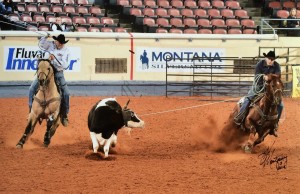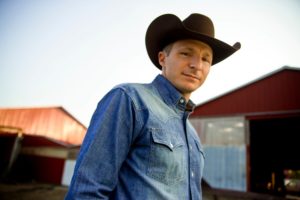Biography
If you were to turn on an old transistor radio and tune it to a country station, you might hear legends like Merle Haggard, Hank Williams, and Johnny Cash crooning from the speakers…but newcomer Paul Bogart could just as easily fit alongside that vintage lineup. Though his songs are fresh and he himself is young, he is an old soul with a knack for capturing time-honored traditions and summing up classic sentiments in catchy, three-minute songs. Exuding sincerity and a rare, down-to-earth charm, Paul Bogart is, simply put, the epitome of traditional country music.
“All of my music just fits under a cowboy hat,” Paul says with an honest laugh, explaining the straightforward appeal of his sound. “I want people to shoot straight with me – to just be real – and that’s what my music is: honest, sincere songs that everyday people can relate to.”

 Possessing elements of a quippy, good-natured Brad Paisley song along with the boots-and-spurs appeal of a George Strait tune, Bogart’s music additionally radiates authenticity, a core component of country music.
Possessing elements of a quippy, good-natured Brad Paisley song along with the boots-and-spurs appeal of a George Strait tune, Bogart’s music additionally radiates authenticity, a core component of country music.
“From the time I was just a kid roping calves, my dad taught me that if you’re good, people will see that—there’s never any need to brag.” That attitude still permeates everything Bogart does today, whether it’s touring the country playing 90 dates a year or writing with some of Nashville’s biggest names in country music. With the heart of a cowboy and the spirit of a gentleman, Bogart also possesses an unrivaled work ethic that displays itself with passion and integrity.
“I started competing in the American Quarter Horse Association at age 12, and never stopped. That organization, along with rodeo scholarships, singlehandedly paid my way through college,” he says with sincere gratitude. With several World Championship titles under his belt by his early twenties, he was also becoming increasingly passionate about music.
“One night, I had a gig booked in Tulsa, but I was also supposed to compete in the AQHA World Championship show in Oklahoma City just a couple hours later,” he explains. “I did not want to give up either opportunity, so I ran offstage after the concert, flew in a buddy’s helicopter to the arena and roped in the World Show twenty minutes later,” he says with a smile.
His can-do attitude and naturally positive disposition have served him well in every arena of life, but his story in the music industry actually begins with a fairy tale-esque incident that embodies the stuff Nashville dreams are made of.
Born and raised in Oologah, Oklahoma, Bogart had played shows everywhere around the area by the time he was in college. However, he had yet to play a hometown show, so during his junior year at Rogers State University, he contacted a local school to see if they needed anyone to play for a fundraiser. The event planner accepted, and soon, homemade makeshift flyers were posted everywhere around town announcing the show. A few days later, Bogart received a phone call at his parent’s house that threw him for a loop.
“I picked up the phone and this guy on the other end says, ‘Hi, my name is Floyd and I work for Garth Brooks. Garth saw your flyers and wants to meet you.’ Well, I thought it was a joke, so I made up some excuse about having to check my schedule!” he recounts incredulously. “A week later, the guy called back and asked again if I had time to meet with Garth, and this time I said, ‘Sir, are you serious?’ He verified everything, and sure enough, Garth had somehow gotten ahold of my college demo album and wanted to talk music.”
 The relationship that ensued from that initial meeting turned into a huge source of encouragement for Bogart, with Brooks urging Bogart to make the quintessential move to Nashville to see if it was a good fit. “I remember Garth telling me, ‘You’re a successful team roper because you’re in Oklahoma; if you want to be a successful musician, you need to move to Nashville.’”
The relationship that ensued from that initial meeting turned into a huge source of encouragement for Bogart, with Brooks urging Bogart to make the quintessential move to Nashville to see if it was a good fit. “I remember Garth telling me, ‘You’re a successful team roper because you’re in Oklahoma; if you want to be a successful musician, you need to move to Nashville.’”
Bogart did end up taking the leap and moving to Music City the summer after his graduation from Rogers State, and with determination and integrity, he chose to work hard and start from scratch rather than exploit his connection with one of country’s living legends. After taking an initial job as his landlord’s fix-it man, Paul got right to work writing and playing with anyone and everyone he could. He soon found himself writing with the likes of Billy Montana (Jo Dee Messina, “Bring on the Rain”), Tom Douglas (Lady Antebellum, “I Run to You”), and Jamie O’Hara (The Judds, “Grandpa (Tell Me ‘Bout the Good Ol’Days)”). Bogart states, “I just appreciate the opportunity to simply be in the same room with these writers, playing and learning from them.”
Just as he was settling into his life as a songwriter and Nashville resident, his world was turned upside down. In the now-infamous Nashville flood of 2010, Bogart’s entire home was all but washed away. “My wife and I got out of the house with the clothes on our back—everything else in our little world was ruined.” With no insurance and a looming mortgage payment, Bogart quickly envisioned two options—he could learn how to hang drywall and install cabinets, or he could do what he did best: play music. “I began calling everyone I’d ever played for, hat in hand, and said, ‘I don’t know if your organization needs any entertainment, but I sure could use the work.’” And from that basic attempt to simply get by, an international touring frenzy was born. “Suddenly I was running the wheels off my truck and playing 90 shows a year,” he says with a huge smile. “It was nothing short of a miracle.”
Now, after nearly a decade of writing, playing and touring, Bogart has begun pulling in big numbers in every arena, literally. Whether it’s the main stage at the AQHA World Championships with thousands in attendance or the social media scene with almost 4 million fans reached through his YouTube tribute, “Cowboy Ride,” Bogart’s songs have connected with America’s Heartland in a real, tangible way that modern country has perhaps missed.
“He is the authentic voice of an audience of westerners who’ve been overlooked by contemporary music,” says Sony Nashville recording artist Trent Willmon of Bogart’s ability to reconnect country music to its roots, “and there’s no better person to bring it back.”
 Bogart has a particular panache for making dusty boots and trail rides seem downright romantic, and that’s just what he’s done on his latest effort, Leather. The album itself is the perfect paradigm of that Old West lifestyle that Bogart himself lives and breathes. Produced by Trent Willmon (Little Big Town’s “Rain on a Tin Roof,” Montgomery Gentry’s “Back When I Knew It All”), Leather is a monument to Bogart’s upbringing and signature Western lifestyle.
Bogart has a particular panache for making dusty boots and trail rides seem downright romantic, and that’s just what he’s done on his latest effort, Leather. The album itself is the perfect paradigm of that Old West lifestyle that Bogart himself lives and breathes. Produced by Trent Willmon (Little Big Town’s “Rain on a Tin Roof,” Montgomery Gentry’s “Back When I Knew It All”), Leather is a monument to Bogart’s upbringing and signature Western lifestyle.
“This album is about hard work, hustle, and loving the woman God gave you,” he says candidly. “It’s about keeping your head down when you win and crawling back in the saddle when you hit the ground.” Sentiments Bogart knows firsthand, having grown up in a family of truckers, team ropers and musicians; the title track, “Leather,” hearkens back to those Heartland roots and homegrown work ethic.
“I think about my grandparents and how hard they worked to make it,” muses Bogart. “It’s given me inspiration and motivation to work hard and never give up on my dreams.” Indeed, Leather taps into the belief that there’s beauty that comes from weathering storms together and seeing hard times through; it’s an anthem for anyone who’s ever pressed on, persevered, or prayed for something better.
Co-written with some of the biggest names in country music — Jim Beavers (Gary Allan’s “Watching Airplanes”), Shane Minor (Eric Church’s “My Kind Of Love”, Kenny Chesney’s “Live A Little”), Leather is set to release on September 8th, 2017 and is poised to resonate with everyday people and fill the increasingly gaping hole in modern country music.
